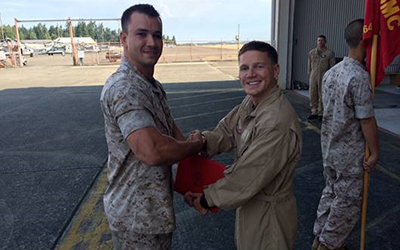Helicopter mechanic swaps wrenches for software development tools

Out of high school, Chicago native Ronald Klemz attended the University of Illinois, intent on becoming a rocket scientist. Only after changing majors twice did Klemz realize what he needed more than anything else was a sense of direction. That’s when he joined the military.
Klemz hoped that joining the Marine Corps would not only provide direction, but would also give him essential tools like leadership, how to set goals and, most important, how to meet them.
For five years, Klemz served as a CH-46E helicopter mechanic stationed at Camp Pendleton. During this time he demonstrated an insatiable appetite for learning, both as an aircraft mechanic and when he was off duty.
What motivated Klemz more than anything else was the example set by some of the sergeants in charge of his unit.
“I really looked up to some of the sergeants in the shop and it was a turning point for me when I saw what they accomplished,” says Klemz. “It inspired me to work on myself and gain skills in my own ways so I could reach the same position.”
Eventually, Klemz was promoted to sergeant and earned the titles of collateral duty inspector (CDI) and quality assurance representative, both of which require extensive studying and mastery of technical details. Klemz’s drive to learn in turn inspired other Marines to achieve the same level of mastery.

“It’s a really big deal because if any maintenance is performed incorrectly, an aircraft could come out of the sky. So it’s the word of that CDI, or the quality assurance representative responsible for even more flight-sensitive items, that maintenance was performed correctly and an aircraft is safe for flight.”
In anticipation of leaving the service, Klemz had already enrolled in online courses and earned a degree in software engineering, graduating summa cum laude. Even so, when his five years were almost done, he was terrified.
“It’s very hard to lose your job, your residence and your sense of being, especially when it’s all you’ve known for years and you lose them all at once. Suddenly, you’re thrust into this new world and need to readjust. That’s why it’s so important to have a solid plan for what you’re going to do.”
Klemz’s plan included completing Microsoft Software & Systems Academy (MSSA) and landing an entry-level job as a software developer. He initially heard about MSSA when a friend passed along a flier outlining the 18-week technical training and career readiness program. MSSA is held at multiple bases across the country and provides active duty U.S. service members with the career skills necessary to meet the IT industry’s high demand for talent.

The coursework for his software engineering degree had all been self-led, so Klemz was looking for some outside perspective. Because he already knew the MSSA course material, Klemz was instructed to start a personal coding project, the largest he’d worked on to date. That, combined with helping others in his cohort, gave Klemz the sort of hands-on experience he needed to increase his confidence.
Klemz was also paired up with Microsoft mentor Jose Cruz, who had completed MSSA and currently works on the Skype team. Cruz offered him great information about Microsoft, how he should behave in the interview and how to tailor his resume — the inside details he wouldn’tnormally get when applying for a job.
Getting that perspective was instrumental in helping Klemz secure a position as a software developer on MS Approvals, an internal tool used by Microsoft managers to approve expenses, requests and actions taken by their direct reports. Klemz built entire features and frameworks from the ground up, which helped expand his skill set and improved his confidence as a developer.
Initially, Klemz was worried about his ability to measure up, but with success came a transfer to a position with additional growth potential on the Payee Management team, which developed an external tool for processing transactions between Microsoft and its partners.
“I like to pick up new things and grow as a person, so perhaps the best part of my day-to-day job is that I learn something new every day, and I’m afforded new opportunities to learn and grow myself as a developer.”
In the long term Klemz hopes to start his own software company. Until then, he’s still focused on learning as much as he can, both inside and outside of work. When he’s not writing code, you’ll likely find him in the hockey rink, the music studio or maybe the boxing ring.
And for those service members who are getting ready to transition to civilian life, Klemz offers this advice: “There are programs that let you know what you can do and what resources are available. If I wasn’t informed about MSSA, then I might not be where I am today. So definitely utilize those resources before you miss out.”
